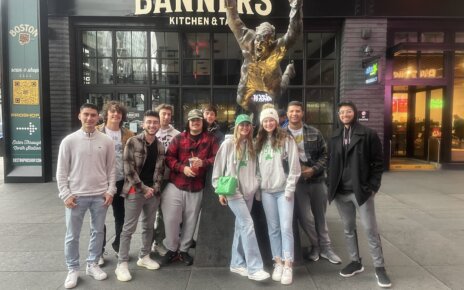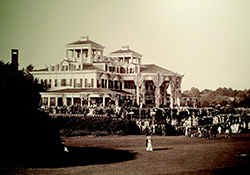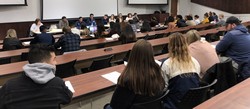The 8th Annual Social Work Alumni Lecture at Monmouth took place on Monday, Nov. 30. The lecture was a presentation called “Born of Rage: Art as an Agent for Social Change” given by Assistant Professor in the School of Social Work Ralph G. Cuseglio, DSW.
Cuseglio’s talk showed the influence of inequality, oppression, discrimination, and social injustice in art, and what kind of impressions were taken and left in certain artist’s work. Whether it was Billie Holiday’s haunting recollections of lynch mobs on “Strange Fruit” or Picasso’s interpretations of Francisco Franco’s regime in Spain in what is his probably most famous painting, “Guernica”, or Childish Gambino’s song “This Is America” about the banality of gun violence, Cuseglio draws connections of certain pieces of art and media to real-world atrocities.
One of the points Cuseglio makes is that artists, through sublimination, can bring substantial awareness to issues that are plaguing them and the world. “There’s an ability to bring things to the surface, that external factors are internalized and processed in a creative fashion to cope with strong feelings.” Cuseglio said. He further explains that “creations can turn unpleasant feelings into a more tolerable form like a song or a painting”
When that creation becomes mainstream or processed by the public and similar feelings are shared, more psychological activities start to occur and that attention can drive change. For example, Cuseglio asked, “Have you ever been excited by a piece of music? Watch a movie that made you cry? Seen a photograph that has stunned you?” Art in all mediums can move someone or something through its ability to translate thoughts and feelings into form, Cuseglio said.
After he was finished presenting, the 2020 Alumni Award Winner and Monmouth Alum Tiriq Callaway gave a small talk, reflecting on his time at Monmouth, his upbringing, and the social work he’s doing today.
In his speech he gave accounts of his life growing up in Atlantic City and the strife he saw daily. He gave ways of how he coped with his situation and compared his own struggles to the struggles of artist’s in the earlier presentation.
He talked about his life’s story of overcoming poverty and racism, and in his emotionally charged speech that left many choked up, he explained how his mistakes lead him to write books and help others. At the end, Callaway summed up the talk saying that “in order to be passionate in the world, you have to be passionate about change.”
PHOTO COURTESY of Monmouth University




